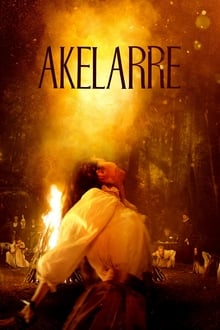
(español / English)
“No hay nada más peligroso que una mujer que baila”
Extracto
Akelarre -reciente ganadora de cinco premios Goya- constituye una potente y lúcida crónica del machista y misógino fanatismo religioso de la Inquisición católica española, de cómo “adecuaba” la realidad a sus prejuicios, y no vacila en poner por momentos en escena su cómica estupidez, imponiendo un giro inesperado al relato y proyectando todos estos hacia el presente político de manera elocuente pero jamás subrayada gracias a su registro realista y con una gran puesta en escena.
…………………………………………………………………………………………………………………………………………………………
Reseña
A comienzos del siglo XVII, un grupo de inquisidores encabezados por el Juez instructor Rostegui (Alex Brendemühl, el Dr. Mengele de Wakolda) y su Consejero (Daniel Fanego) llega a un pueblo pesquero del País Vasco (apenas una escala en su funesto recorrido) y arresta y tortura a un grupo de jóvenes adolescentes acusándolas de brujería, en un típico caso de los procesos de instrucción llevados a cabo por la Inquisición española.
El abordaje que hace el director argentino (y coguionista) Pablo Agüero de este evento histórico es muy rico, con sus múltiples dimensiones proyectándose sobre el presente.
En primer lugar, la dupla inquisidora, que combina el fanatismo religioso del juez instructor con la escéptica frialdad burocrática del consejero. La forma en que Rostegui en los interrogatorios interpreta y “adapta” la realidad a sus prejuicios, los ridículos silogismos de la dialéctica en que a veces quedan atrapados ambos, tienen una potente y vigente resonancia política. Y sus oportunas citas de la poesía mística de Santa Teresa de Ávila son un elocuente recordatorio de la innegable carga sexual que subyace.
El grupo de adolescentes, acusadas de participar de un Sabbat (aquellarre) -es decir, de una misa negra para adorar a Lucifer- por el simple hecho de bailar en el bosque, es descripto y actúa con un adecuado registro anacrónico o si se quiere atemporal.
Las chicas, lideradas por Ana (notable Amalia Aberasturi), de algún modo poco contaminadas por la cultura machista y misógina dominante, hacen gala de una espontaneidad totalmente racional y la ponen en juego para enfrentar el juicio de los inquisidores, imponiendo en determinado momento un giro a lo sombrío del relato al poner en evidencia y aprovecharse de la estupidez cómica de todo fanatismo.
Las duras escenas de cautiverio, interrogatorios y tortura son absolutamente actuales y al mismo tiempo, en un ida y vuelta, imponen el sello de “medieval” a todos los autoritarismos, fundamentalismos y abusos políticos que siguieron luego.
La reconstrucción de época y la puesta en escena, con fuertes claroscuros pictóricos que remiten a Goya están muy logradas, así como la música y las canciones que entonan las prisioneras por momentos son sobrecogedoras. Mención aparte para el uso del fuera de campo, que particularmente en una escena, constituye una decisión genial.
En suma, Akelarre constituye una potente y lúcida crónica del machista y misógino fanatismo religioso de la Inquisición católica española, de cómo “adecuaba” la realidad a sus prejuicios, y no vacila en poner por momentos en escena su cómica estupidez, imponiendo un giro inesperado al relato y proyectando todos estos elementos hacia el presente político de manera elocuente pero jamás subrayada y con una gran puesta en escena. …………………………………………………………………………………………………………………………………..
"There is nothing more dangerous than a woman who dances"
Abstract
Akelarre (Coeven) -recent winner of five Goya awards- constitutes a powerful and lucid chronicle of the macho and misogynistic religious fanaticism of the Spanish Catholic Inquisition, of how it "adapted" reality to its prejudices, and does not hesitate to stage its comic stupidity at times , imposing an unexpected twist on the story and projecting all these towards the political present in an eloquent way but never underlined thanks to its realistic register and with a great staging.
………………………………………………………………………………………………………………………………… ……………………
Review
At the beginning of the 17th century, a group of inquisitors led by the investigating judge Rostegui (Alex Brendemühl, Dr. Mengele de Wakolda) and his Counselor (Daniel Fanego) arrived at a fishing village in the Basque Country (just one stopover in their disastrous journey ) and arrests and tortures a group of young adolescents accusing them of witchcraft, in a typical case of the investigation processes carried out by the Spanish Inquisition.
The approach that the Argentine director (and co-writer) Pablo Agüero makes of this historical event is very rich, with its multiple dimensions projected onto the present.
In the first place, the inquisitive duo, which combines the religious fanaticism of the investigating judge with the skeptical bureaucratic coldness of the counselor. The way in which Rostegui interprets and "adapted" reality to his prejudices in the interrogations, the ridiculous syllogisms of the dialectic in which both are sometimes trapped, have a powerful and current political resonance. And his timely quotes from the mystical poetry of Santa Teresa de Ávila are an eloquent reminder of the undeniable sexual charge that underlies.
The group of adolescents, accused of participating in a Sabbath (that one) -that is, a black mass to worship Lucifer- for the simple fact of dancing in the forest, is described and acts with an adequate anachronistic register or if you want timeless.
The girls, led by Ana (notably Amalia Aberasturi), somehow little contaminated by the dominant macho and misogynistic culture, display a totally rational spontaneity and put it into play to face the judgment of the inquisitors, imposing at a certain moment a turn to the gloomy of the story by exposing and taking advantage of the comic stupidity of all fanaticism.
The harsh scenes of captivity, interrogations and torture are absolutely current and at the same time, in a round trip, they impose the stamp of "medieval" on all the authoritarianism, fundamentalism and political abuse that followed later.
The period reconstruction and staging, with strong pictorial chiaroscuro that refer to Goya are very successful, as well as the music and songs that the prisoners sing at times are overwhelming. Special mention for the use of the off-field, which particularly in a scene, constitutes a great decision.
………………………………………………………………………………………………………………………………. .